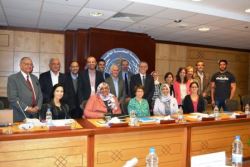 An expert consultation on evidence-based guideline development and adaptation was organized at the Regional Office in Cairo, Egypt, from 18 to 19 November 2015. The consultation was in line with one of WHO’s core functions, which is the development of evidence-based guidelines which can guide health policy-makers, health care practitioners and users in making informed health decisions based on research findings and consensus among experts taking into account the local contexts and available resources.
An expert consultation on evidence-based guideline development and adaptation was organized at the Regional Office in Cairo, Egypt, from 18 to 19 November 2015. The consultation was in line with one of WHO’s core functions, which is the development of evidence-based guidelines which can guide health policy-makers, health care practitioners and users in making informed health decisions based on research findings and consensus among experts taking into account the local contexts and available resources.
The objectives of the meeting were to:
- review and discuss global/regional experiences and methodologies for evidence-based guideline adoption and adaptation;
- reach an agreement on the main approaches for a framework of action for the Regional Office to assist in promoting adaptation of globally developed evidence-based guidelines and development of guidelines in areas of need, as well as supporting their implementation in practice.
The consultation was attended by 10 international experts who are involved in guideline development and adaptation, in addition to representatives from the Regional Office and headquarters.
In his opening remarks, Dr Ala Alwan, WHO Regional Director for the Eastern Mediterranean, noted that one of the challenges to the uptake of globally WHO developed guidelines is the variety of contexts and cultures across regions and Member States. He added that guidelines cannot be necessarily adopted “as is” across settings, given the contextual differences. This highlights the potential need for adapting these guidelines at regional and then eventually on country level in a way to facilitate their uptake. He stressed the importance of discussing the needs of end users of public health guidelines, and the processes of and methods for guideline adoption and adaptation.
During the consultation, the global and regional experiences and methodologies were discussed. It was noted that the scope of WHO guidelines is usually driven by Member States’ demand, department interest and donor funds. The importance of capacity-building in clinical epidemiology and governance mechanisms was emphasized. The participants also highlighted the need for regional coordination, guideline awareness-raising, sharing resources, listing unmet needs, priority-setting and updating epidemiological and disease burden data.
At the end of the consultation, it was agreed that support was needed from WHO in the following areas:
- Mapping needs for guideline activities in similar groups of countries in the Region;
- Connecting expert groups, evaluating the cumulative know-how in the Region to plan what further capacities are needed, use groups of experts to build such capacities;
- Promoting research, with assistance of WHO collaborating centres, and providing bridges between governments and researchers;
- Adapting existent guidelines, especially for major noncommunicable diseases of public health importance
- Developing new guidelines for region-specific conditions (for which no guidelines exist), in coordination with WHO headquarters;
- Galvanize resources, efforts, capacities and centers of excellence for guideline adaptation and implementation in the Region.


